Top Presales Software for 2026

Over the past few years, presales technology has exploded onto the tech scene.
Demo automation tools had the most buyer traffic of any new G2 category last year, showing just how fast teams are investing in this space.
And over the past year, the category has evolved even further. Presales platforms began integrating AI into their core feature sets to build personalized demos, generate technical content, and analyze engagement data quicker.
But with all the hype around presales software, it’s tough to know exactly what it is, how it can improve sales outcomes, and which software is ideal for your organization.
So, let’s clarify: presales software helps sales engineers and solution consultants create, manage, and analyze demos before a deal closes.
In this piece, we’ll explore the main types of presales software, explain why more and more GTM teams are adding these tools to their tech stack, and round up some of the best presales tools on the market today.
What is Presales Software?
Presales software enables solution consultants, demo engineers, and solution architects to manage their workload and better highlight their software’s functionality in a way that captivates and engages prospects.
Today’s presales tools go beyond presentation to combine demo automation, analytics, and engagement tracking.
Different Types of Presales Software
In short, presales software makes presales professionals’ lives easier. But that’s still pretty broad — and that’s why there are multiple subcategories of presales software, including:
Sales Discovery Software
Sales discovery software helps reps record and structure buyer information during discovery. With built-in templates and AI-assisted notetaking built in, these tools keep every presales call consistent and actionable.
Demo Automation Software
Demo automation software lets teams build guided or self-serve product demos that prospects can explore on their own time.
Navattic, for example, makes it easy to create interactive, no-code demos that track engagement and identify new stakeholders.
Another hallmark of these tools is that they show SEs which features buyers click on, how long they spend going through a demo, and who they share the demo with internally.
Sandboxing & Live Demo Tools
Sandbox and live demo tools are designed for companies that need full, live product environments rather than pre-captured walkthroughs.
Reprise and Testbox, for instance, let SEs create cloned versions of their app for complex, data-driven demos.
Or for a lighter-weight sandbox, tools like Navattic automatically links captured product screens together, creating a sandbox experience that SEs and AEs can use on live calls.
While these live demo tools offer a deeper level of realism (after all, they are clones of your product), they require significantly more setup and technical resources than something like a guided interactive demo.
Navattic automatically links captured product screens together, creating a lightweight sandbox experience that SEs and AEs can use on live calls or in follow-up emails.
Presales Management Software
Presales management software centralizes presales team activity, reporting, and capacity planning.
Good examples of presales management software include Vivun and Homerun, which help leaders measure workload, resource allocation, and SE impact on revenue.
Presales Automation Tools
Presales automation tools use AI to handle repetitive admin tasks, like RFP responses, security questionnaires, and other one-off sales queries.
SiftHub, Opine, and trumpet connect to your knowledge base to autofill documentation and generate tailored content for presales teams.
How Presales Software Improves Buyer Experience
Yes, presales software is meant to help SEs, SCs, sellers, and other GTM team members streamline their workflows.
But it’s also doing something else: improving the buyer experience.
When prospects can explore a product on their own, they come to sales calls prepared, asking questions that make the conversation more productive.
After incorporating interactive demos into their sales cycle, SwipedOn got great feedback from the sales team: their leads were much more qualified.
“Leads from Navattic (we track attribution with UTMs) have an understanding of the product by the time they meet with sales and often want to discuss specific functionality.”
Airbase had a similar experience. “Interactive demos are like a perfect mid-funnel offer for our site to build pipeline. I can provide value to our prospects quickly and make sure that there’s fit and alignment for our value proposition with them.”
When SEs have prospect engagement data right in front of them, they can design a much more customized live demo, interactive demo, or sandbox.
The team at Haloo actually distributes demos to prospects ahead of sales calls and at conferences so they have a much better idea of what to expect: “The thirty-minute sales call can be laser-focused on actual deal-making rather than trying to figure out who they are, what they're doing, and what they're interested in.”
The Best Presales Software for 2026
Below, we cover a list of tools that span demo automation, presales management, and AI workflow orchestration in detail – pros, cons, and pricing.
But if you’re just skimming, here are our top picks:
- Navattic is a demo automation platform for mid-market or enterprises that want to use interactive guided demos across their entire GTM motion.
- trumpet for digital sales room to create a collaborative buying experience.
- Testbox for managers looking to standardize discovery, mutual accountability plans, and demos.
- Vivun for presales folks who want to do demos in as close to a "live" environment as possible (with some customization).
- Opine to leverage AI to keep CRM updated, calls summarized, and stakeholders aligned.
- Consensus for demos used in the sales cycle as demo leave-behinds.
- Homerun for sales engineers who want to centralize all of their data.
- Reprise for large, complex demo environments for live calls.
- Walnut for templated live sales demos to clone and personalize.
- Demostack for customizing live demo data (text, pictures, and other elements).
- Iris to cut your RFP response time in half.
- Qwilr to build modular, branded, interactive web-based proposals and demo follow-ups.
A Quick Look At the Best Presales Software
Since the presales tools category is growing quickly, it’s important to understand the different types of software out there and which ones are leading the pack.
To help you make the most informed decision about which presales tools your organization might benefit from most, we collected G2 reviews, scoured Reddit comments, and interviewed actual buyers who evaluated these platforms themselves.
Keep reading to find out what they think:
| Software | Type | Best For | Standout Feature | Ideal Use Case | Pricing |
|---|---|---|---|---|---|
| Navattic | Interactive demo | Best for mid-market or enterprise teams that want to use demo automation | No-code demo automation, Chrome extension, CRM syncs, etc. | Using Launchpad to manage, personalize, and track demos to sales | Starter: $0/mo; Starter Plus: $40/mo; Base: $500/mo; Growth: $1,000/mo; Enterprise: Talk to sales |
| Trumpet | Presales management | Reps looking to centralize assets in a single buyer-friendly location | AI-driven personalization to tailor each Pod for every prospect | Centralized buyer collaboration | Starter: £50/user; Pro: £20/user |
| Vivun | Presales management | Managers looking to standardize discovery, mutual accountability plans, and demos | Feature requests tied to presales roadmap | Teams managing presales in Salesforce | Custom pricing |
| TestBox | Live demo | Presales folks wanting to make demos as close to a “live” experience as possible | Create their own sandbox for buyers to test. Customized to each prospect’s needs | Buyers exploring sandbox environments pre-purchase | Starts at $4,750 for 15 users |
| Opine | Presales management | Presales and post-sales teams with an AI-powered OS that automates POV workflows | CRM updates, Slack pings, handoffs, and automation | Automatically track deal progress and POV insights | Starts at $2,500/year |
| Consensus | Video demos | SEs embedded in sales cycles making video demos and related content | Personalization through video sharing and engagement tracking | Sharing async video demos and tracking engagement | Free: $0/mo; Lite: $130/mo |
| Homerun | Presales management | Sales engineers who want to centralize all of their notes | Share updates and notes for SEs, AEs, or sales managers | Automating POV workflows across presales and post-sales | Custom pricing |
| Reprise | Interactive demo, Live demo | Large, complex demo environments for live calls | Plain walkthroughs, live demos, and sandboxes | Building complex live demo environments | Does not share pricing |
| Walnut | Interactive demo | Interactive sales demos to personalize and scale | Templates for personalized demos and presentations | Creating personalized demo templates for AEs | Lite: $9.2K/yr; Pro: $20K/yr; Enterprise: Contact sales |
| Demostack | Demo automation, Live demo | Customizing live data demos (text, pictures, elements) | Supports iframes, pop-ups, and animated elements | Delivering pixel-perfect interactive demos | Annual pricing starts at $55,000/year |
| Iris | Presales automation | Presales teams that want to automate filling out RFPs and security questionnaires | AI learns from past RFPs and completes first drafts | Generating accurate, compliant first-draft responses | Pricing is not public |
| Qwilr | Presales automation | Presales and sales teams that want to automate their follow-up content | Interactive ROI calculators, videos, and legal disclaimers | Creating eye-catching proposals and sales documents | Business: $35/user; Enterprise: Custom pricing |
Navattic
Navattic’s Launchpad feature enables presales teams to use demo automation for pre-call discovery, live sandboxes, and post-demo leave-behinds.
SEs start building product demos by capturing the parts of the product front-end they want users to see, then connect each screen using native global linking, and finally, mass edit text and images to their liking.
By sending demos straight from Launchpad, reps can:
- Gather prospect intent data.
- Uncover new stakeholders and sync them to your CRM.
- Tailor follow-ups based on real engagement data.
To save them even more time, they can create automated playbooks that activate based on specific demo engagement events. These can automatically send notifications, update CRM fields, or trigger other actions to keep sales conversations going.
Plus, reps can work entirely out of a Chrome extension, so they don’t need to log into another platform to use demos.
Type: Demo automation (interactive demo)
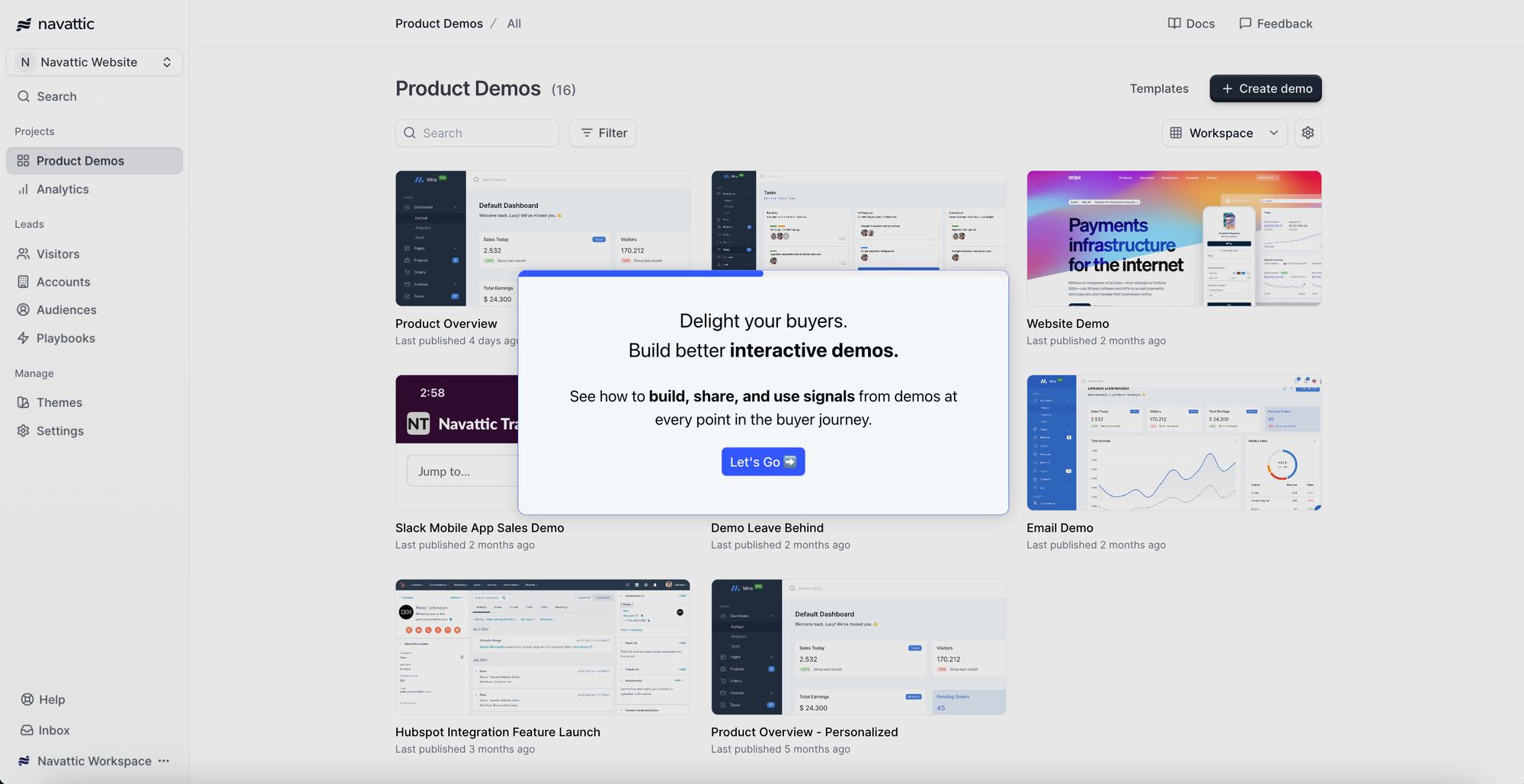
Try an interactive demo of Navattic
What users like
- Wide application across presales and other teams. “After working with the amazing Navattic team, we are now using the tool to support our sales team, support team, and even our internal product training!” (G2 Review)
- Ease of use. Users say things like: “Navattic was a solid option when I was at my previous company. Drove a lot of inbound interest without having to write a line of code - super easy to use WYSIWYG user experience.” (Reddit)
- Knowing exactly how prospects are interacting with the demo to tailor follow-ups or nurture campaigns. “The analytics are a huge plus, giving us insights to tailor follow-ups effectively. Their support team is always responsive and helpful. Highly recommend Navattic for any team looking to elevate their sales process.” (G2 Review)
What users don’t like
- Navattic isn’t a full replica of your product, making it better for demos of specific features rather than offering SEs their own demo environment.
- Terminology can be tough to get the hang of. Laura Lashmar at eStreamly explains, “If I’m not in Navattic every day, I lose what specific terms like ‘modal’ and ‘tooltip’ mean and have to refresh my memory.”
Pricing
We have 5 pricing plans at Navattic:
- Starter: $0/month, which comes with 2 builder licenses, 1 HTML demo, and unlimited demo views, and basic analytics.
- Starter Plus: $40/month, which gets you unlimited media demos, checklists, Slack integration, webhooks, custom themes, and AI Copilot.
- Base: $500/month, which comes with 5 builder licenses, unlimited HTML demos, unlimited demo views, unlimited integrations, custom themes, Navattic JS, in-app demo suggestions, and a dedicated CSM.
- Growth: $1,000/month, which comes with all Base plan features, plus 10 seats, Launchpad, account engagement, A/B testing, advanced filters, in-app collaboration, custom domains, SSO and directory sync, demo translation, and multi-team onboarding.
- Enterprise: Talk to sales, comes with all Growth plan features, plus custom seats, offline demos, audit logs, professional services, priority support, and demo consultation.
trumpet
trumpet is a digital sales room platform that helps go-to-market teams turn every deal into a collaborative buying experience - from first outreach to onboarding and expansion.
With trumpet, any rep can instantly create interactive, branded Pods (digital workspaces) that centralize every asset, call recording, demo, and next step in a single buyer-friendly link.
Each Pod is fully trackable, showing who’s engaged, what they’ve viewed, and how interested they are, helping teams prioritize deals and personalize follow-up with confidence.
Type: Presales management
What users like
- Centralized buyer collaboration. Every doc, recording, and demo lives in one interactive workspace that’s easy to share and revisit.
- Real-time engagement insights. “See exactly when prospects revisit materials, which sections they spend time on, and who on their team is engaging. This intel has helped me close deals by knowing exactly when to follow up and what to address.” (G2 Review)
- Deep integrations. Connects seamlessly with Salesforce, HubSpot, Gong, Salesloft, and Navattic to automate data flow and engagement tracking.
- AI-driven personalization. Automatically tailors each Pod to your prospect’s brand, role, and priorities using AI-generated layout and content suggestions.
What users don’t like
- Initial setup for large teams can take time due to the range of integrations and customization options.
- Some users note they’d like more security protocols for more enterprise access control (G2 Review)
Pricing
trumpet offers a tiered pricing model that scales by team size and functionality:
- Free: £0 per user/month, includes 10 free Pods, unlimited users, 40+ integrations, mutual action plans, basic analytics, version control
- Pro: £29, unlimited Pods, unlimited uploads, templates, Pro analytics, CRM integrations, content management system
- Scale: £60, Pro features plus: TrumpetSign, AI components, advanced analytics, proposals & quotes, video/screen recording, e-signature integrations
- Elite: £100, Everything in Scale plus: SSO, multi-team workspaces, white labeling, custom domains, advanced security, premium support
Testbox
Testbox sits atop a live instance of your product and acts as a demo environment for prospects to explore.
Since it’s not a carbon copy of your product, you can show whatever features you want — even the complex ones. And you can even use AI to generate synthetic data, making the sandbox experience feel even more authentic.
Type: Live demo
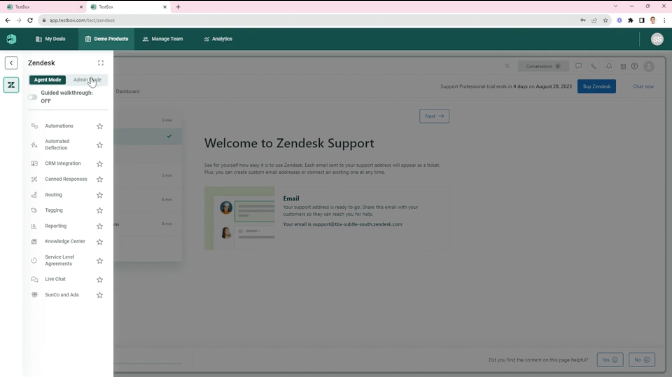
What users like
- Users can create their own TestBox sandboxes, customize them to each prospect’s needs, and generate fake data. “Testbox is super helpful for making the environment available to Sales persons with data filled in that visually looks sufficient for showing someone around the product to show potential customers how the experience will look.” (G2 Review)
- Backend analytics will tell you who has interacted with your demo environment and what they did in it.
What users don’t like
- Because you're building an entire demo environment, Testbox completes implementation for you, and it takes 60 days or more.
- It doesn’t work on all browsers. “The tool didn't work on all the browsers correctly. We couldn't get the Safari plugin to work.” (G2 Review)
- There’s a lag. Users say, “sometimes can be slow but overall is improving” and “it seems to be a bit slower than native systems.” (G2 Review, G2 Review)
Pricing
TestBox has three different plans:
- Startup: Starts at $44,750 for 15 users, for creating 1 demo or POC experience without integrations.
- Growth: Starts at $59,500 for 15 users, for products with multiple product modules and larger data requirements or integrations.
- Enterprise: Contact sales, for companies with interconnected product suites and AI-powered workflows.
Note that implementation is an add-on fee. Additional users cost $1,200/year.
Vivun
Vivun is a presales workspace built on top of Salesforce that enables team members to develop templates, share strategies, and measure their success — backed by the power of AI and machine learning.
Because Vivun integrates with calendars and CRMs, presales team leads can pinpoint where team members spend the most time and what activities generate the best outcomes.
Type: Presales management
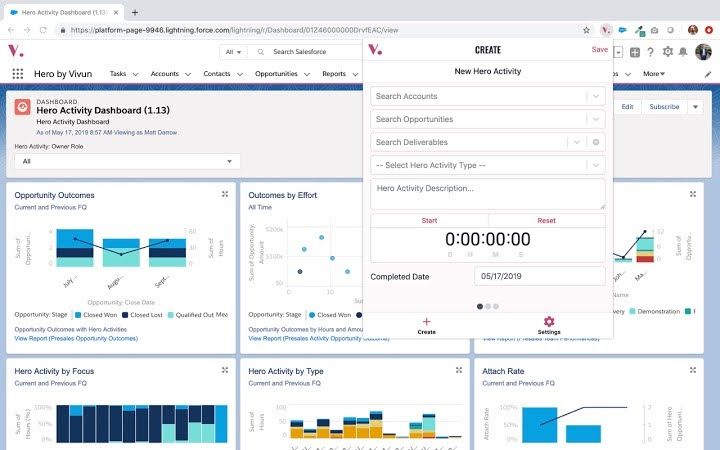
What users like
- Managers can produce step-by-step processes to standardize and maximize the results from buyer evaluations, discovery, mutual accountability plans, and demos.
- You can track and show SE work. “As a leader, I use this to show when SEs are overworked or spending too much time on post-sales, travel, partners, etc. It’s also great data to keep SE/rep ratios reasonable.” (Reddit)
- Users can tie feature requests from the field to active sales opportunities, showing how changes to the product roadmap could influence future wins.
What users don’t like
- Reporting. Reviewers report: “The analytics in the platform could be improved, but they give us all the data we need to write our own reports,” and “I have some specific reporting requests to better enable team leaders to ensure that we are ingesting as much data into the system as possible.” (G2 Review, G2 Review)
- The platform can be “a little clunky,” and the Salesforce integration can be tricky. (G2 Review, G2 Review)
Pricing
According to their G2 profile, Vivun pricing is based on “edition, user types, number of users, and commitment terms.”
Opine
Opine is the AI-native presales operating system designed for teams tired of manual updates and scattered deal data. It connects to tools like Slack, Zoom, Email, and your CRM to automatically track deal progress, summarize calls, and surface POV insights without the daily admin burden.
Rather than relying on users to log every update, Opine acts as a behind-the-scenes copilot that keeps your CRM fresh, your team in sync, and your leadership looped in. It’s built for teams running multiple proofs-of-value across complex deals, where visibility, consistency, and best practices are non-negotiable ensuring successful handoffs between presales and post-sales.
Type: Presales management

What users like
- Easy to use. “The UI and AI are amazing. We can now create complex POCs in seconds, compared to using spreadsheets. I also love how Opine helps us keep track of customer requests and bugs, allowing us to easily inform leadership about what's blocking our deals.” (G2 Review)
- AI tools. “I love Opine's AI feature. It can connect to Slack and surface certain things, such as blockers, tasks, issues, etc., and also post to Slack to specific channels.” (G2 Review)
What users don’t like
- Rigid integrations. “The Jira integration is excellent, but a bit rigid. The team is working on making it more dynamic, per our feedback.” (G2 Review)
- Lack of reporting. “The PoV readout could be better, and I'd love to have a way to present from within. The team worked on this feature but shelved it due to a lack of interest, and we're hoping they'll revive it.” (G2 Review)
Pricing
- Essentials: $59/mo per editor
- Advanced: $89/mo per editor
- Elite: $139/mo per editor
Consensus
Consensus is a demo automation video platform that focuses on reducing the number of unqualified demos for your sales and presales teams. Presales teams can create demos from prerecorded videos, slides, and other documents and store them on the Consensus platform.
When prospects select topics of interest, they are directed to a demo that showcases relevant product features and benefits.
Because Consensus links are sharable within an organization, presales teams can uncover new stakeholders they may not have realized could become champions of the product.
Type: Demo automation (video)
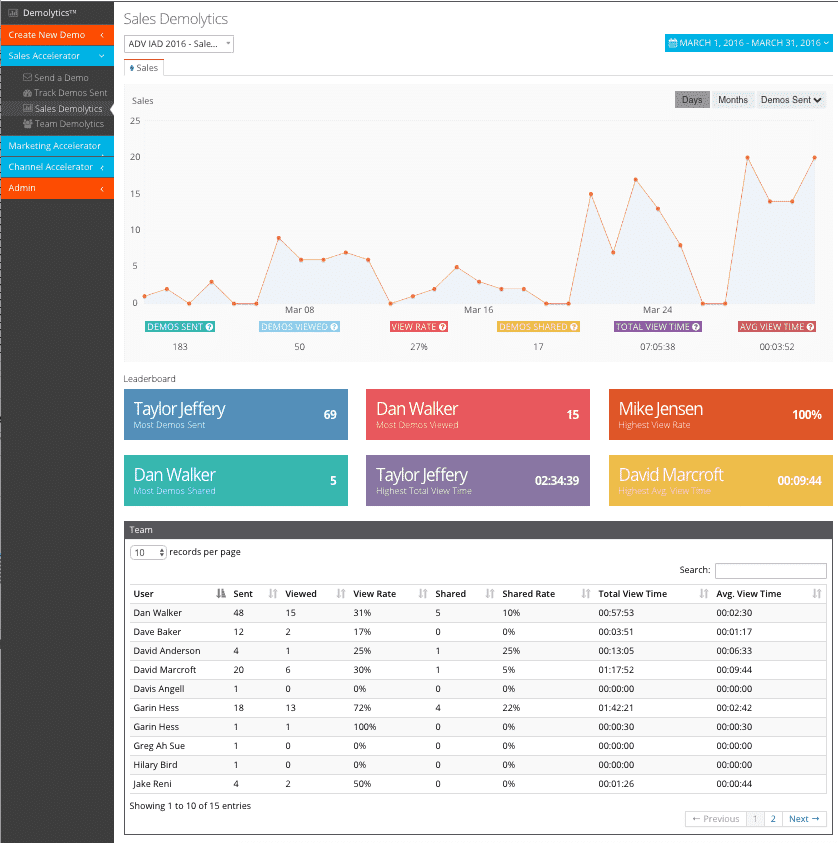
What users like
- You can customize videos for specific prospects or customers with stakeholder intelligence built in. “Prospects can pick and choose what is important to them with an HRIS which then creates a personalized demo just for them!” (G2 Review)
- As a prospect watches the demo, Consensus tracks their reactions, noting which demos are more or less popular. “By leveraging built in analytics, we can identify customers that have engaged with the content and help others who may need our support.” (G2 Review)
What users don’t like
- On G2, users have reported an unintuitive UI without the ability to search through your videos and lengthier setup times.
- Complex UI. Users say: “Building out demo boards can be a bit tedious as it requires interfacing with a separate team,” and “Nice in theory, weak in practice. It’s kind of a rickety platform to use, and most of the time it’s used for a hail mary to sub in for a meeting the AE can’t get booked. ” (G2 Review, Reddit)
- Disjointed plans. Sales and marketing components of Consensus seem to be sold separately (G2 pricing), which could be a deal breaker for your team’s budget.
Pricing
Per their website: “Pricing is based upon role and license quantity.”
Homerun
Homerun is a workspace built by sales engineers for sales engineers (and their managers). Presales leaders can use Homerun to measure performance, prep for one-on-ones, and get deal updates, while SEs and SCs can prep for demos, track their activity, and take notes.
Integrations with all kinds of tools — including CRMs like Salesforce and HubSpot, product management platforms like Jira and GitHub, and communication tools like Slack and Teams keep all presales data organized and accessible to anyone at any time.
Type: Presales management

What users like
- Centralization. Most presales folks are stuck using multiple tools (CRMs, spreadsheets, emails, calendars) to track their work, but Homerun bakes all that into their tool. “I like the ease of use in terms of having a single page for every opportunity that requires little scrolling but still provides an overview of everything that is going on in the opportunity.” (G2 Review)
- Highly tailored to sales engineers. A majority of G2 Reviews have titles like: “Finally a Tool Tailored to Sales Engineers!” or “The Homerun Presales team is a Leader's Best Friend!” (G2 Review, G2 Review)
What users don’t like
- Its UI. Reviewers say things like, “The UI is a bit outdated and clunky but improving in every update,” and “Some of the chart features are a bit clunky, and it would be helpful to be able to see all action items at once.” (G2 Review, G2 Review)
- The Salesforce integration could be a bit broader, such as syncing on the account level. (G2 Review, G2 Review)
Pricing
Homerun doesn’t make their pricing public. But it does promise no user minimums, no integration fees, and no onboarding or customer support fees.
Reprise
In Reprise, users can build three kinds of demos: walk-throughs, live demo overlays, and sandboxes, making it a good fit for companies that need all three and want to centralize demo creation.
However, its complexity severely steepens the learning curve for marketers, SEs, and AEs, which, in turn, curbs time to value. And, like other sandbox demos, it opens customers up to the kinds of errors you get in live environments.
Type: Demo automation (interactive demo), Live demo

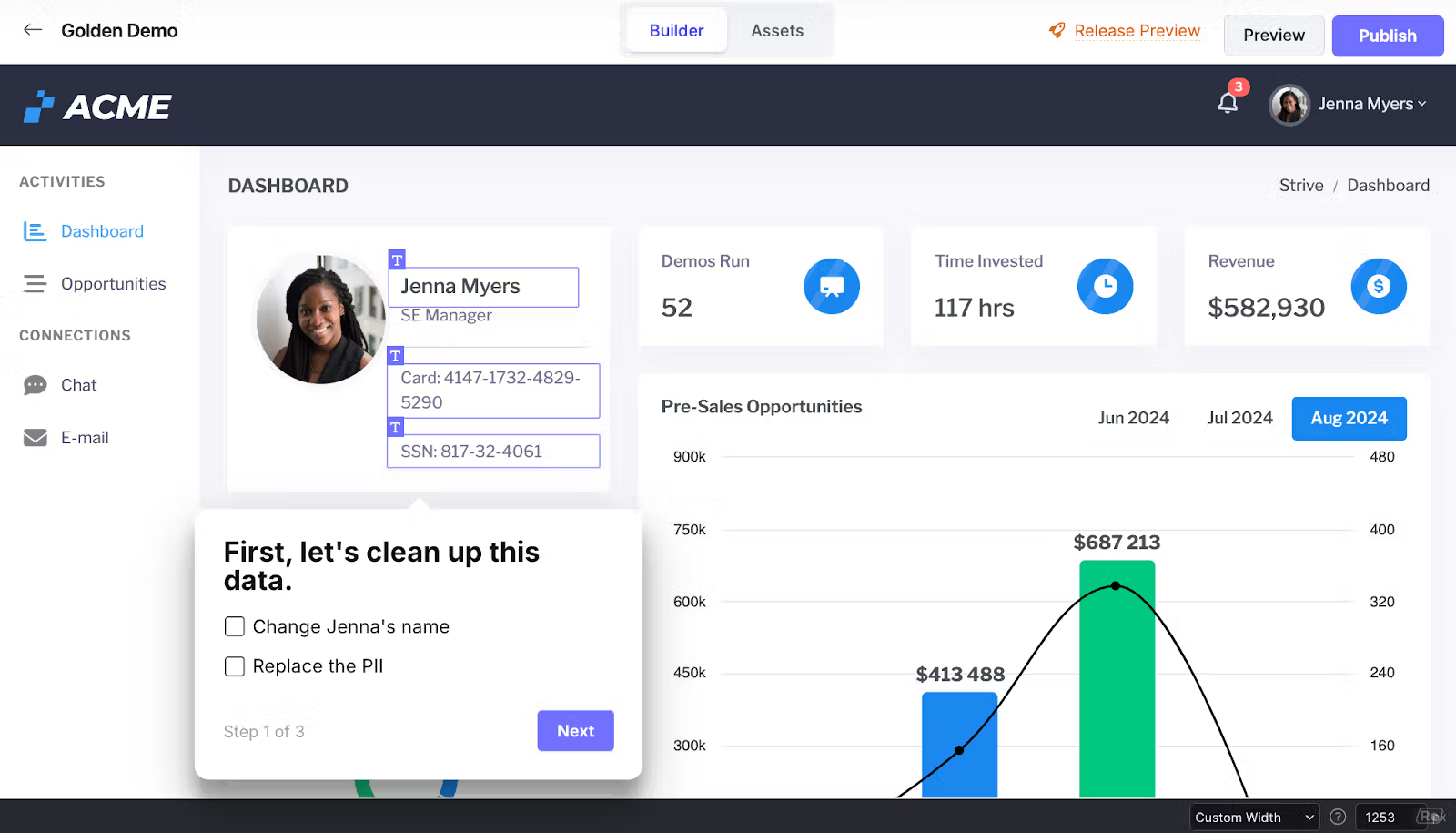
What users like
- Supports large, complex demo environments, such as the likes of Zendesk, MongoDB, and Databricks. “If your primary purpose is to support live demos for your sales team, you should take a look at Reprise.” (Reddit)
- Good customer service. “The customer and engineering support from Reprise has been helpful, and they have been able to accommodate specific use cases that required custom code.” (G2 Review, G2 Review)
What users don’t like
- According to G2, Reprise is “slower to reach ROI” than Navattic and other presales tools. One user said, “To utilize all of its features, all of its capabilities, it takes time to learn. There are some rather more technical pieces to it as well that require more specialized knowledge.” (G2 Review)
- Lack of marketing features. “I find myself wishing it had more features that helped with end to end top of funnel tracking for SDR, BDR, etc.” (G2 Review)
Pricing
Does not publicly share its pricing, which we’ve heard scales up based on the number of demos and user seats.
Walnut
Walnut takes a sandbox approach, capturing your product's front end with a Chrome extension and then allowing users to edit and personalize through a no-code interface or HTML.
Once a user finishes creating their demo, it’s added to a shared library, which can be categorized, saved for future use, or cloned and updated for a live call.
Type: Demo automation (interactive demo)

What users like
- Prospects can leave comments and questions as they go through a demo, and AEs can respond asynchronously or use those comments as an entry point for another sales call.
- If your product integrates with another software, you can capture both platforms and demo how they work together. “It helps showcase integrations with other platforms that often require SCs (clickthrough with a script they can follow). Has considerably cut down SC requests.” (Reddit)
What users don’t like
- Getting up to speed takes time. “Other tools tend to have certain, what seems to be basic, functionality that Walnut lacks or requires customization. The building experience takes a bit longer to grasp, though a recent update has made it a bit easier.” (G2 Review)
- Limited support for mobile apps. Users say, “Support for Mobile Apps is a little convoluted, but they seem to be working on it,” and “We had some difficulty building Walnut demos from a mobile point of view because the platform only allows us to take screencaptures from a web browser.” (G2 Review, G2 Review)
- White-labeling, SSO, offline demos, and advanced translations are all paid add-ons, and Deal Intel, their reporting functionality, is still in beta per their website.
Pricing
Walnut has three pricing plans:
- Lite: $9,200/year, comes with unlimited demos, unlimited website embeds, unlimited integrations, demo analytics, advanced HubSpot integration, Walnut Uncover, and playlists.
- Pro: $20,000/year, comes with everything in Lite, plus a dedicated CSM, expert technical training & go-live support, and advanced Salesforce integration.
- Enterprise: Contact sales, comes with custom pro services projects, a dedicated account team, ongoing technical services, on-site support options, enterprise-grade security, and multi-team support.
Demostack
Demostack leverages cloud-based recording technology to create a copy of your product’s front-end UI. This “environment” learns how your backend responds to requests from the browser and simulates that response during playback, giving users a real feel experience.
Demostack also has live interactive demo functionality, letting users add what they call “Overlays” of edits atop your existing product to highlight specific features for specific use cases, personas, or verticals. In “Presenter Mode,” you can demo your product from a fresh browser window with prompts and pre-designed prompts from a demo playbook.
Type: Demo automation (interactive demo), Live demo
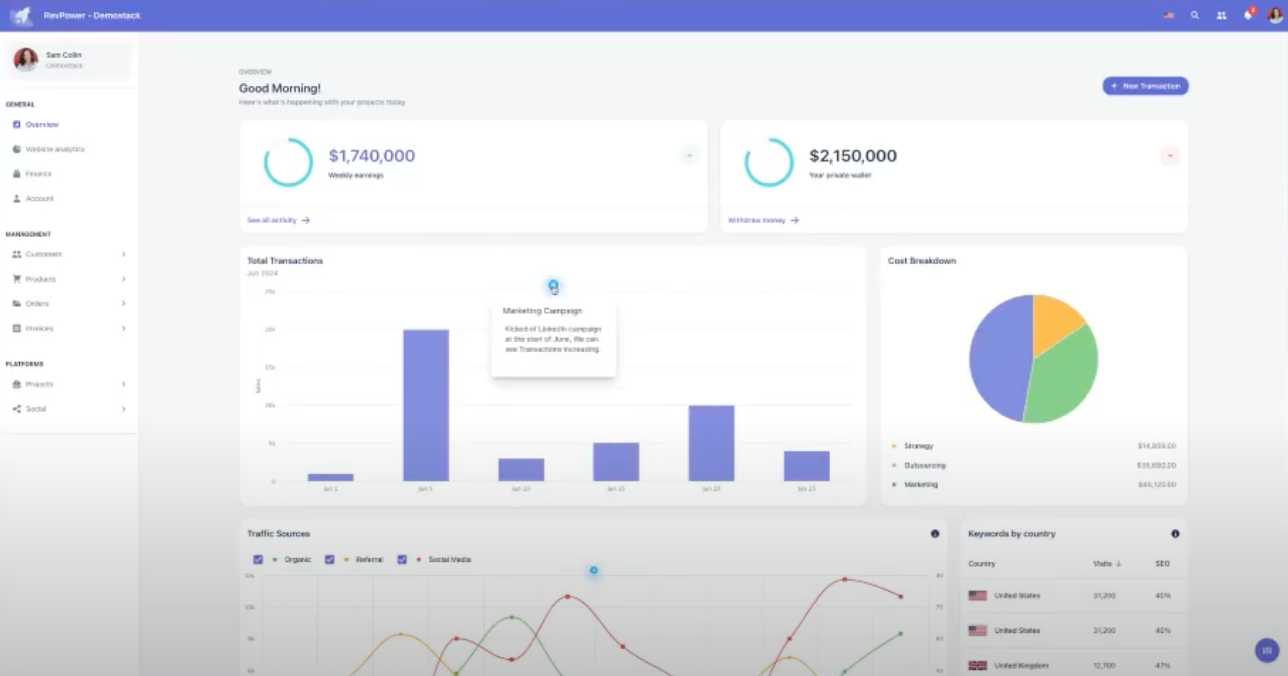
What users like
- Demostack is a 1:1 replica of your product’s front end, so users get as close to experiencing your product as possible (including seeing iFrames, pop-ups, and animations).
- Extra features for modifying content, “like text, pictures, and other elements.” (G2 Review)
What users don’t like
- Ongoing maintenance. “Since it captures your product at a specific moment in time, any updates or changes made to the actual product necessitate recreating all existing clones from scratch.” (G2 Review)
- A lack of customization for demoing more complicated products and features. “It's very hard to make it flexible to get more clicks and scenarios on the same environment. Demostack is fine to show a high-level overview but not to scale complex demo scenarios.” (G2 Review)
- No free trial. According to the FAQs on their pricing page, you can only sign up for a personalized live demo.
Pricing
Annual pricing starts at $55,000 per year.
Iris
Presales teams can spend hours upon hours filling out prospect RFPs and security questionnaires, taking valuable time away from more strategic work.
Iris’s AI platform learns from past RFPs, documentation, and other relevant content to draft responses for you in minutes. It also shows you exactly where it got the answer, making it easy for you to verify before submitting.
Not only does it cut hours of manual lift, it also reduces reliance on tribal knowledge that more senior presales employees may just have in their heads.
Type: Presales automation

What users like
- Expedited RFPs. Users say things like: “The AI suggestions are actually useful and not just generic fluff, plus it’s fast. We went from spending days on a response to maybe a few hours, tops.” (G2 Review) and “Iris has completely changed the way we do RFPs. It cuts down time from hours to what used to take days.” (G2 Review)
- Easy management. “I like how easy it is to manage and find content in my library. I was able to get up and running in one week and responded to our first RFP in the first month.” (G2 Review)
- Low rates of hallucination. “The answers are consistently high quality. We’ve had no issue with hallucinations, and managing the knowledge base has been very simple.” (G2 Review)
What users don’t like
- Occasional slowness. “The only issue I really have with it is that it is sometimes a bit slow. Most of its issues are due to AI itself, not the platform.” (G2 Review)
- Manual content uploads. “It would be cool if you could just point IRIS to a content repository vs. having to manually ingest documents.” (G2 Review)
- Lack of integrations. “Would like to see some more integrations, but I know the team is growing and continuing to add.” (G2 Review)
Pricing
Iris does not have public-facing pricing. However, their website says that the platform is “priced per user, and includes unlimited collaborators.”
Qwilr
Qwilr transforms static presales assets into interactive web-based proposals and demo follow-ups that help sales engineers and AEs communicate value, not just product functionality.
Instead of sending PDFs or slide decks, teams can use Qwilr to build modular, branded pages that include live pricing, embedded product videos, analytics, and e-signature and payment capabilities.
Every page is fully trackable, showing which sections a prospect viewed, shared, or interacted with. This gives reps the context they need to tailor follow-up conversations and identify decision-makers earlier in the cycle.
Because Qwilr integrates directly with CRMs like HubSpot, Zoho, Pipedrive, and Salesforce, presales and sales teams can templatize their content, automate proposal creation from deals, and maintain a single source of truth for sales collateral performance.
Type: Presales automation

What users like
- End-to-end experience. “It’s hands down the best solution out there for creating stunning proposals, sales documents, and client presentations. The ease of use, the beautiful templates, and the interactive features make it stand out from anything else I’ve tried.” (G2 review)
- Design flexibility. “I like how simple it is to create new templates using the editor and incorporate interactive elements like demos and videos into your proposals.” (G2 Review)
- Analytics and integrations. “The seamless integrations, analytics, and automation features have been game-changers for us and our clients. If you're looking for a modern, intuitive, and visually impressive way to present information such as agreements and proposals, Qwilr is absolutely worth it!” (G2 review)
What users don’t like
- Limited industry-specific templates.
- Learning curve for users new to building web pages vs. documents.
Pricing
Qwilr offers two plans to fit growing sales teams:
- Business: $35/user/month includes e-sign, QwilrPay, analytics, and real-time notifications.
- Business plans can be upgraded with identity verification and custom branding add-ons.
Enterprise: $59/user/month includes everything in Business and custom branding, team permissions, and template-level settings.